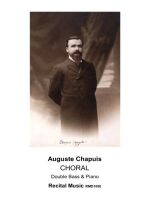Plaisir d’Amour

Double Bass & Piano
Composer: Jean-Paul-Égide Martini
Product code:
RMD1237
Publisher: Recital Music
£3.50
Description
Plaisir d’Amour transcribes beautifully for the double bass, emphasising its ’s lyrical and sonorous qualities throughout its rich middle register.
This edition includes piano accompaniments for both solo and orchestral tunings.
Composed in 1784, setting words by Jean-Pierre Claris de Florian (1755- 1794), Plaisir d’Amour has been popular for over 200 years and has been reinvented by each singer and for a new generation. In 1859 Hector Berlioz arranged Plaisir d’Amour for voice and orchestra, adding an evocative and stylish accompaniment to the most perfect of melodies, which helps to account for its longevity.
In the 1920s Édouard Nanny arranged the song for double bass and piano, published in 1929 by Alphonse Leduc (Paris), although the edition attributes it to G.B. Martini, also known as Padre Martini.
Although I have written about the double bass for more than 35 years, probably penning several million words, this is the first time I have been able to include both the double bass and Elvis Presley in the same paragraph, alongside Hector Berlioz, UB40, Joan Baez, Nana Mouskouri, Placido Domingo and Emmylou Harris.
All are connected to the 18th-century song Plaisir d’Amour which was first arranged for double bass by the French bassist Édouard Nanny (1872-1942). Composed by Jean-Paul-Égide Martini in 1784, setting words by Jean-Pierre Claris de Florian (1755-1794), Plaisir d’Amour has been popular for over 200 years and has been reinvented by each singer and for a new generation.
Martini was born Johann Paul Aegidius Martin in Freystadt (Bavaria) on 31 August 1741 and adopted the Italianised form ‘Martini’ when he moved to France. There he established himself as a court musician writing a wealth of music including operas, sacred works, chamber music and military music. In 1794 he was appointed Inspector of the newly created Conservatoire, where he also taught composition, and in 1814 he became Superintendent of Royal Music but died two years later in Paris on 14 February 1816. Sometimes he is known as ‘Martini Il Tedesco’ or Giovanni Martini, which is why he is often confused with Giovanni Battista Martini and is best remembered today for this one song.
In 1859 Hector Berlioz arranged Plaisir d’Amour for voice and orchestra, adding an evocative and stylish accompaniment to the most perfect of melodies, which helps to account for its longevity.
In the 1920s Édouard Nanny arranged the song for double bass and piano, published in 1929 by Alphonse Leduc (Paris), although the edition attributes it to G.B. Martini, also known as Padre Martini. These Martini’s certainly liked to cause confusion with so many different names. Nanny adds an unaccompanied introduction for double bass, punctuated by tonic and dominant chords, before the song itself begins. In D major, the melody is presented simply and with the addition of double stops in the second verse, contrasted by music of a more urgent nature in the tonic minor, before the theme is reprised and ends gently and successfully, an octave higher ad lib. Nanny removes the piano introduction before each verse, tightening the structure, but both versions are wonderfully effective in performance.
Nanny’s transcription was a favourite of the Czech virtuoso, František Pošta (1919- 1991), who recorded it with harpsichord accompaniment on The Grancino Double Bass of František Pošta in 1975 for Supraphon. He performed it at recitals around the world and his ‘singing style’ was ideally suited to a work which is all about beauty of tone and a cantabile approach.
Alphonse Leduc’s edition is long out of print and, although it may not appeal to the younger generation, this is a song which is already more than 200 years old and I am certain will still be performed long after we are all gone. The double bass transcriptions of Plaisir d’Amour will be too easy for today’s thrusting young soloists, who only want to play the most virtuosic of pieces, but general audiences respond to it far better than they do to much of our original solo repertoire.
Leading singers from the 18th to the 21st-century have performed the song and none more successfully than ‘the King’. Elvis Presley recorded it as Can’t Help Falling in Love for the album Blue Hawaii in 1961, which was also included in a film of the same name. It topped the UK charts in 1962, selling more than a million copies in the US, and was performed as the final song in Elvis’s live performances in the 1960s and 70s. It was re-recorded in 2015, to mark his 80th birthday, using an archival voice recording with a new orchestral accompaniment performed by the Royal Philharmonic Orchestra.
Plaisir d’Amour is a simple and effective song, describing the pleasures of love, and has certainly stood the test of time. Whether performed by double bass, flute or trumpet, sung by folk singers or opera stars, this beautiful melody remains timeless. How nice that I can write about the double bass and Elvis in the same article. This is surely a first!
[David Heyes]
Plaisir d’amour ne dure qu’un moment, chagrin d’amour dure toute la vie.
J’ai tout quitté pour l’ingrate Sylvie, Elle me quitte et prend un autre amant.
Plaisir d’amour ne dure qu’un moment, chagrin d’amour dure toute la vie.
“Tant que cette eau coulera doucement vers ce ruisseau qui borde la prairie,
je t’aimerai”, me répétait Sylvie,
l’eau coule encor, elle a changé pourtant.
Plaisir d’amour ne dure qu’un moment, chagrin d’amour dure toute la vie.
The pleasure of love lasts only a moment, The grief of love lasts a lifetime.
I gave up everything for ungrateful Sylvia, She is leaving me for another lover.
The pleasure of love lasts only a moment, The grief of love lasts a lifetime.
“As long as this water will run gently
Towards this brook which borders the meadow, I will love you”, Sylvia told me repeatedly.
The water still runs, but she has changed.
The pleasure of love lasts only a moment, The grief of love lasts a lifetime.
Look Inside
Description
Plaisir d’Amour transcribes beautifully for the double bass, emphasising its ’s lyrical and sonorous qualities throughout its rich middle register.
This edition includes piano accompaniments for both solo and orchestral tunings.
Composed in 1784, setting words by Jean-Pierre Claris de Florian (1755- 1794), Plaisir d’Amour has been popular for over 200 years and has been reinvented by each singer and for a new generation. In 1859 Hector Berlioz arranged Plaisir d’Amour for voice and orchestra, adding an evocative and stylish accompaniment to the most perfect of melodies, which helps to account for its longevity.
In the 1920s Édouard Nanny arranged the song for double bass and piano, published in 1929 by Alphonse Leduc (Paris), although the edition attributes it to G.B. Martini, also known as Padre Martini.
Although I have written about the double bass for more than 35 years, probably penning several million words, this is the first time I have been able to include both the double bass and Elvis Presley in the same paragraph, alongside Hector Berlioz, UB40, Joan Baez, Nana Mouskouri, Placido Domingo and Emmylou Harris.
All are connected to the 18th-century song Plaisir d’Amour which was first arranged for double bass by the French bassist Édouard Nanny (1872-1942). Composed by Jean-Paul-Égide Martini in 1784, setting words by Jean-Pierre Claris de Florian (1755-1794), Plaisir d’Amour has been popular for over 200 years and has been reinvented by each singer and for a new generation.
Martini was born Johann Paul Aegidius Martin in Freystadt (Bavaria) on 31 August 1741 and adopted the Italianised form ‘Martini’ when he moved to France. There he established himself as a court musician writing a wealth of music including operas, sacred works, chamber music and military music. In 1794 he was appointed Inspector of the newly created Conservatoire, where he also taught composition, and in 1814 he became Superintendent of Royal Music but died two years later in Paris on 14 February 1816. Sometimes he is known as ‘Martini Il Tedesco’ or Giovanni Martini, which is why he is often confused with Giovanni Battista Martini and is best remembered today for this one song.
In 1859 Hector Berlioz arranged Plaisir d’Amour for voice and orchestra, adding an evocative and stylish accompaniment to the most perfect of melodies, which helps to account for its longevity.
In the 1920s Édouard Nanny arranged the song for double bass and piano, published in 1929 by Alphonse Leduc (Paris), although the edition attributes it to G.B. Martini, also known as Padre Martini. These Martini’s certainly liked to cause confusion with so many different names. Nanny adds an unaccompanied introduction for double bass, punctuated by tonic and dominant chords, before the song itself begins. In D major, the melody is presented simply and with the addition of double stops in the second verse, contrasted by music of a more urgent nature in the tonic minor, before the theme is reprised and ends gently and successfully, an octave higher ad lib. Nanny removes the piano introduction before each verse, tightening the structure, but both versions are wonderfully effective in performance.
Nanny’s transcription was a favourite of the Czech virtuoso, František Pošta (1919- 1991), who recorded it with harpsichord accompaniment on The Grancino Double Bass of František Pošta in 1975 for Supraphon. He performed it at recitals around the world and his ‘singing style’ was ideally suited to a work which is all about beauty of tone and a cantabile approach.
Alphonse Leduc’s edition is long out of print and, although it may not appeal to the younger generation, this is a song which is already more than 200 years old and I am certain will still be performed long after we are all gone. The double bass transcriptions of Plaisir d’Amour will be too easy for today’s thrusting young soloists, who only want to play the most virtuosic of pieces, but general audiences respond to it far better than they do to much of our original solo repertoire.
Leading singers from the 18th to the 21st-century have performed the song and none more successfully than ‘the King’. Elvis Presley recorded it as Can’t Help Falling in Love for the album Blue Hawaii in 1961, which was also included in a film of the same name. It topped the UK charts in 1962, selling more than a million copies in the US, and was performed as the final song in Elvis’s live performances in the 1960s and 70s. It was re-recorded in 2015, to mark his 80th birthday, using an archival voice recording with a new orchestral accompaniment performed by the Royal Philharmonic Orchestra.
Plaisir d’Amour is a simple and effective song, describing the pleasures of love, and has certainly stood the test of time. Whether performed by double bass, flute or trumpet, sung by folk singers or opera stars, this beautiful melody remains timeless. How nice that I can write about the double bass and Elvis in the same article. This is surely a first!
[David Heyes]
Plaisir d’amour ne dure qu’un moment, chagrin d’amour dure toute la vie.
J’ai tout quitté pour l’ingrate Sylvie, Elle me quitte et prend un autre amant.
Plaisir d’amour ne dure qu’un moment, chagrin d’amour dure toute la vie.
“Tant que cette eau coulera doucement vers ce ruisseau qui borde la prairie,
je t’aimerai”, me répétait Sylvie,
l’eau coule encor, elle a changé pourtant.
Plaisir d’amour ne dure qu’un moment, chagrin d’amour dure toute la vie.
The pleasure of love lasts only a moment, The grief of love lasts a lifetime.
I gave up everything for ungrateful Sylvia, She is leaving me for another lover.
The pleasure of love lasts only a moment, The grief of love lasts a lifetime.
“As long as this water will run gently
Towards this brook which borders the meadow, I will love you”, Sylvia told me repeatedly.
The water still runs, but she has changed.
The pleasure of love lasts only a moment, The grief of love lasts a lifetime.



